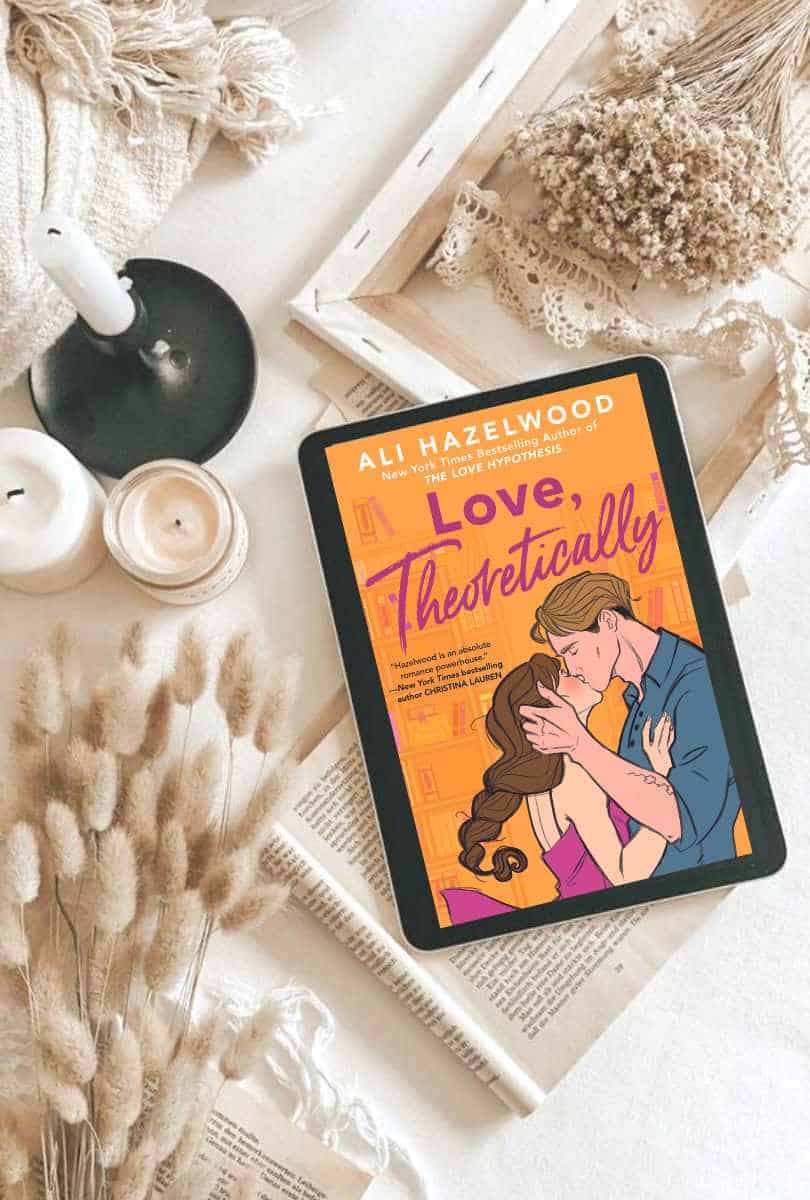PLOT: 4/5 ENTERTAINMENT: 4/5 CHARACTERS: 4/5 OVERALL: 4/5
“Have you considered that maybe you’re already the way I want you to be? That maybe there are no signals because nothing needs to be changed”
– Ali Hazelwood, Love, Theoretically
Ali Hazelwood has established herself as an author who writes about women in STEM (the fields of science, technology, engineering, and math). After I read The Love Hypothesis, I was eagerly waiting to read her new standalone release Love, Theoretically. Especially owing to the fact that I love stories that involve women who are super qualified and getting their dues in male-dominated fields.
The plot of Love Theoretically
Elsie Hannaway is a theoretical physicist. She’s an adjunct professor, which means she grades labs and teaches about thermodynamics. Her big goal is to become a tenured professor so she can complete her important projects.
Elsie also has Type 1 Diabetes, but her insurance doesn’t pay for her medical costs. Because of this, she ends up working for a fake dating app to make extra money.
Elsie makes it to the last stage of interviews at MIT for her dream job, but she finds herself clashing with Jack Smith. Jack is an experimental physicist and happens to be the older brother of her favorite client.
He’s also the person who harmed her mentor’s career and gave a bad name to theoretical physicists everywhere by writing an article when he was a frustrated and angry teenager.
Elsie is incredibly eager for this job, and she’s unwilling to surrender without putting up a fight. She recognizes Jack’s appeal, yet she must manage her emotions carefully. Could her attraction to Jack eventually transform into a deeper affection for this theoretical physicist?
My Thoughts
In Ali Hazelwood’s signature style, Love, Theoretically too lives up to expectations. I found Elsie and Jack’s characters delightful. Their story begins with a clash, as Jack suspects Elsie of deceiving his younger brother (even though she’s fake dating him, the full truth isn’t hers to share).
This sparks a series of clever exchanges that only grow more entertaining as the story unfolds. The witty banter between them keeps improving and becoming even more enjoyable.
I especially loved the scene where Elsie had to conduct a class as part of the interview process. The way she managed the class, which was primarily in favor of experimentation, was truly impressive. She excelled, literally kicking ass, and everyone, including Jack, was thoroughly impressed.
Ali has discussed and clarified the distinction between theoretical and experimental physicists – detailing their roles and highlighting how their collaboration is crucial for advancing discoveries in the field.
The recurring theme of women in STEM having to repeatedly prove themselves was once again emphasized, as skilfully portrayed in her previous works.
Love, Theoretically seamlessly incorporates references from The Big Bang Theory and The Twilight Saga, enhancing its narrative.
Elsie, known for her habit of trying to please others, often ends up doing things she doesn’t enjoy due to her difficulty in saying no.
It’s only towards the story’s conclusion that Jack becomes attuned to this aspect of her personality. He brings it to her attention, prompting Elsie to consciously prioritize her own needs.
In terms of romance and intensity, this book features a gradual development of their relationship, leading to them getting together in the final third. During this phase, there’s a greater focus on conversation rather than immediate physical interactions, as Elsie embarks on a journey to discover her own sources of pleasure.
Jack easily qualifies as a top candidate for the role of a book boyfriend. He shows strong support for Elsie, takes care of his grandmother, and their regular check-ins reflect his wonderful character. His heartfelt explanation of why he’s drawn to Elsie is simply perfection.
One thing that didn’t sit well with me was the portrayal of Diabetes – I noticed some medical inaccuracies, which I understand might be a result of creative liberty in crafting a fictional character’s story.
Regarding the cover, I couldn’t help but notice its resemblance to The Love Hypothesis. It would have been nice if the book had a distinct cover to establish its own unique identity.
I hope to see Ali explore new themes in her future works, as this one can feel a bit repetitive compared to what we’re already familiar with.
Nevertheless, if you’re a fan of women in STEM, academia, enemies-to-lovers dynamics, and slow-burn romance – and if you enjoyed The Big Bang Theory – I recommend giving Love Theoretically a read.
Can’t wait to read it? Buy your copy of Love, Theoretically using the link below.
